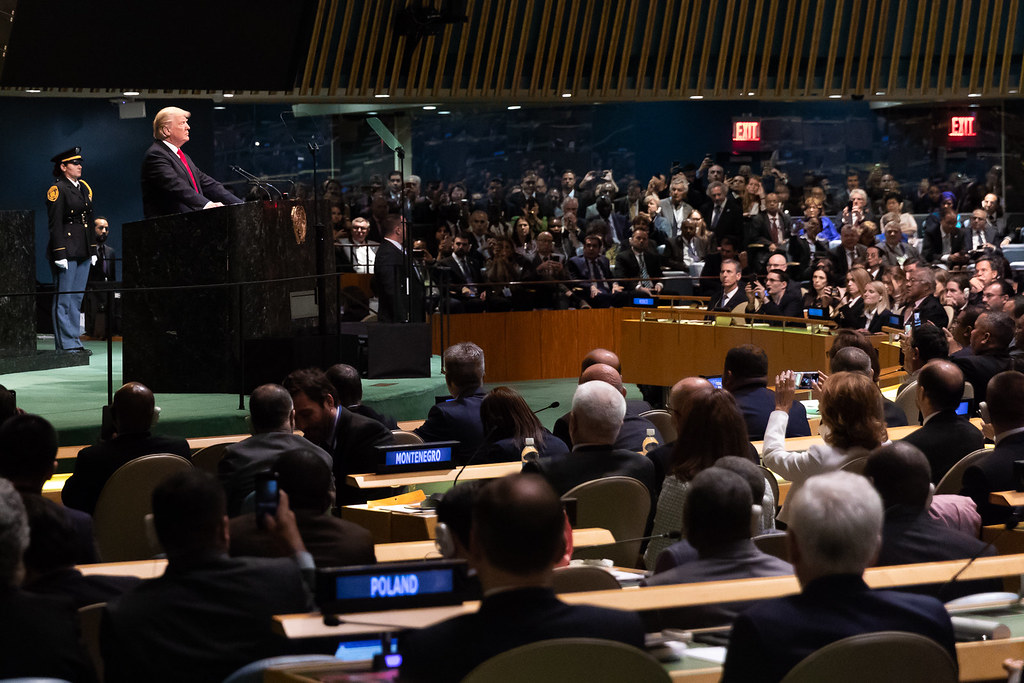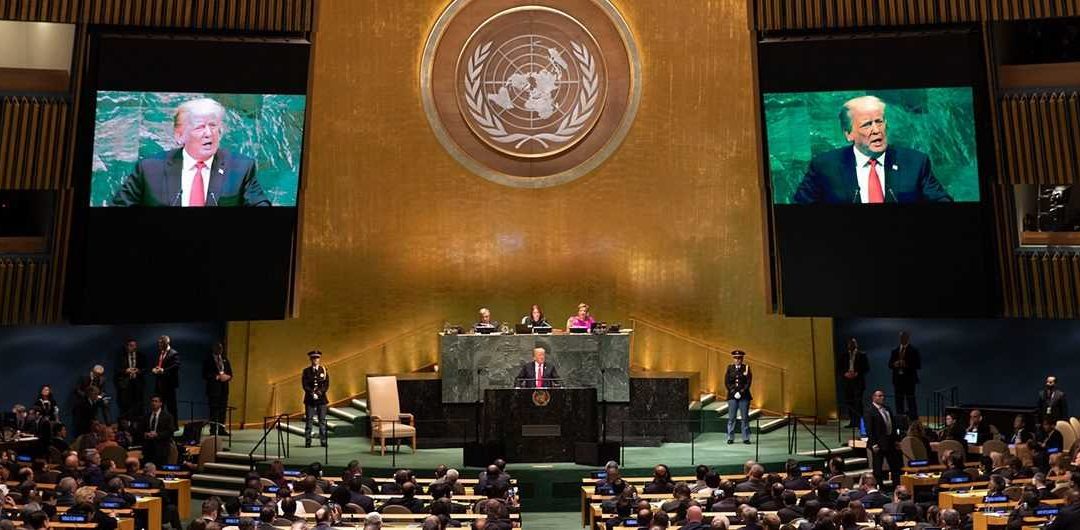Laura E. Kirkpatrick
Editor, Writer and Researcher for PassBlueUnited Nations Secretary-General António Guterres took pre-emptive strikes against President Donald Trump in his speech at the opening session of the 72nd General Assembly, on Sept. 19, 2017. Rumors were rampant that Trump would deliver a strongly nationalistic speech, reportedly written by Stephen Miller, author of Trump’s more bombastic and nationalist screeds, including the inauguration speech on Jan. 20.
Indeed, at the UN, Trump’s speech on Sept. 19 attempted to disrupt and possibly combust the cooperative worldview of the UN. But before he took the podium in the General Assembly Hall, Guterres preceded him by about a half hour, giving him ample opportunity to promote a multilateral philosophy based on the rule of law, embedded with pointed remarks toward Trump.
“Societies are fragmented. Political discourse is polarized,” Guterres said. “Trust within and among countries is being driven down by those who demonize and divide.”
Guterres spoke on seven points: the nuclear threat posed by North Korea, terrorism, global unresolved conflicts, climate change, equality, technology and migration. In almost each point, his remarks could have been perceived as direct hits on Trump.
On climate change, for example, Guterres said: “We should not link any single weather event with climate change. But scientists are clear that such extreme weather is precisely what their models predict will be the new normal of a warming world.”
Regarding the peril on nuclear brinkmanship between the US and North Korea, Guterres said, as another example: “When tensions rise, so does the chance of miscalculation. Fiery talk can lead to fatal misunderstandings. . . . We must not sleepwalk our way into war.”

Donate

“In the world now, with its uncertainty, we need more negotiating, not less, more of the multilateral system, not less,” Temer said. “We need the UN more now, a UN that is increasingly legitimate. It’s imperative to reform the UN, expand the United Nations Security Council to align to the reality of the 21st century. . . We need to reject exasperated forms of nationalism.”
Soon, Trump delivered on the rumors that he would speak about nationalism and topped even that. The Trump who used tepid language in yesterday’s UN reform meeting was replaced today with bold, occasionally horrifying language prioritizing national self-interest and the role that UN member states can have in protecting an individual nation’s sovereignty, security and prosperity.
“The scourge of our planet today is a small group of rogue regimes that violate every principle on which the United Nations is based,” he said. “They respect neither their own citizens nor the sovereign rights of their countries.”
Trump repeated calls for patriotism, a love of one’s country, while he questioned the investment, both in economic and human capital, the US has made in helping the UN to reach its potential.
A sample: “If we desire to lift up our citizens, if we aspire to the approval of history, then we must fulfill our sovereign duties to the people we faithfully represent. We must protect our nations, their interests, and their futures. We must reject threats to sovereignty, from the Ukraine to the South China Sea… ”
He verbally attacked Iran, Syria, Venezuela, Cuba and North Korea — threatening all-out war against the last country. He used military-style phrasing, pitting bad guys against the good guys. He excoriated socialism and cheered capitalism, expressed loathing for the UN Human Rights Council.
“If the righteous many do not confront the wicked few, then evil will triumph,” he said. “When decent people and nations become bystanders to history, the forces of destruction only gather power and strength.”
He fell into his patriotism theme repeatedly; this one referring to the UN:
“The true question for the United Nations today, for people all over the world who hope for better lives for themselves and their children, is a basic one: Are we still patriots? Do we love our nations enough to protect their sovereignty and to take ownership of their futures? Do we revere them enough to defend their interests, preserve their cultures, and ensure a peaceful world for their citizens?”
Trump’s messaging was so disturbing for some heads of state that the first woman to speak after him, Doris Lutheard, president of Switzerland, broke from her text to counter Trump’s plea for isolationist patriotism. She declared, in English:

Donate
Donate
While Trump disregarded protocol in language and approach, one person in his delegation seemed to be aware of the welcoming role that the host country to the UN, America, is supposed to play.
As the US delegation exited — after Trump had left the hall — followed by Nikki Haley, the ambassador to the UN; National Security Adviser H.R. McMaster; and Secretary of Treasury Steve Mnuchin — Secretary of State Rex Tillerson broke formation to shake Guterres’s hand.
It was a moment of grace sorely missing from the Trump rant that had left the General Assembly Hall stunned if not enraged. A 10-minute break was called for the world’s leaders to gather their wits. — LAURA KIRKPATRICK
France: Not long after Trump finished, Emmanuel Macron, president of France, took his turn at the podium in the General Assembly, leaning on formulaic language to present his country’s agenda, mostly centered on multilateralism, preventing war and climate change. He then held a media briefing to a roomful of mostly French journalists. Pressed on his relationship with Trump, especially in response to his speech, Macron replied, “We have many views that align.”
The third time he was pressed on Trump, Macron finally hinted at pressures, saying: “President Trump and I respect each other but we have disagreements. We each have own beliefs. History will judge us on Iran, on North Korea and on climate.”
Climate was the one area where Macron openly criticized Trump. Macron called the US departure from the Paris Agreement a “mistake.” He announced he would be convening a multilateral summit in December in Paris, to expand the foundations laid by the Paris Agreement two years ago. On Iran, North Korea and other global conflicts, Macron followed a UN script, expressing the need for diplomacy and a political solution and the belief that a military solution is untenable.
He also declared that the Iran nuclear deal was not negotiable.
For a head of state who has been in office less than six months, Macron has quickly adopted the UN rheotoric and the diplomatic dodge. On North Korea, he said, for example, “Multilateralism doesn’t exclude resorting to war, multilateralism provides a framework for military intervention, and that should be in diplomatic road map.”
When asked why he spoke recently to CNN rather than French media while in New York, Macron replied, “I have spoken to French media, when I see how much [attention is paid to] what I say, what I don’t say, feels very narcissistic to me.” –– LAURA KIRKPATRICK

